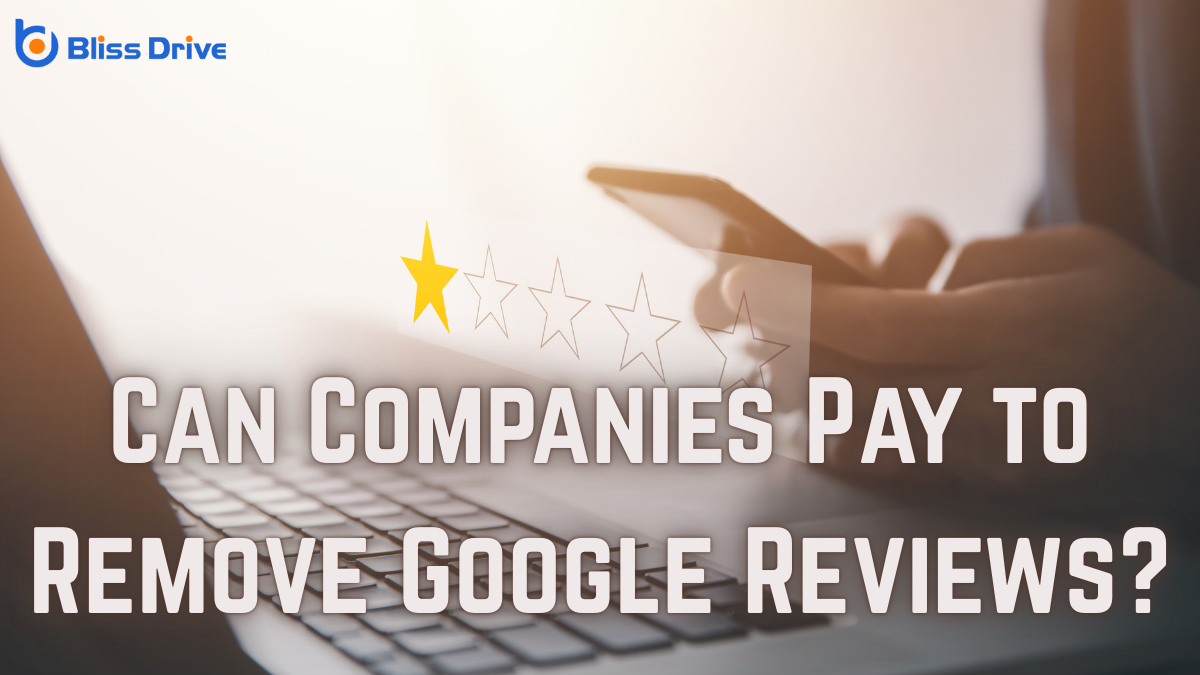Learn More About Us

Have you ever wondered if companies can pay to have their Google reviews removed? It seems like a quick fix for businesses dealing with negative feedback, doesn't it? But the reality might surprise you. Google has strict policies in place to guarantee the authenticity and integrity of its review system. So, do businesses have any other options to manage their online reputation effectively? Let's explore this intriguing topic further.
Google Reviews play an essential role in shaping a company's online reputation and influencing consumer decisions. When I search for a business, the star ratings and comments are often the first things I notice. They guide me in choosing products and services, ensuring I make informed decisions.
These reviews, written by people like you and me, offer genuine insights into customer experiences. I've learned that each review contributes to a business's overall rating, impacting its visibility on search engines.
When I leave a review, I'm not just sharing my opinion; I'm helping others make choices. It's fascinating how a simple comment can build trust and credibility.
Understanding Google Reviews means recognizing their power and responsibility in shaping business success and customer satisfaction.

As I explore how reviews influence businesses, it's important to understand the guidelines that govern them.
Google's review policy guarantees that reviews remain fair and reliable. The platform prohibits reviews that are fake, spammy, or created by someone with a conflict of interest. They also don't allow reviews that include offensive language, personal attacks, or irrelevant content.
Google encourages genuine feedback from real experiences to maintain a helpful environment for both consumers and businesses.
If a review doesn't meet these standards, businesses or users can flag it for removal. Google then assesses the review to determine if it violates their policies.
Understanding these rules helps businesses navigate reviews more effectively, guaranteeing a level playing field in the digital marketplace.
Despite what some might believe, companies can't simply pay to have unfavorable Google reviews removed. I've often heard this misconception, but it's important to clarify that Google doesn't offer a pay-to-remove service.
While it may seem tempting to find a quick fix, the truth is that reviews remain unless they violate Google's content policies, like spamUnsolicited and irrelevant emails sent to a large number of recipients. or inappropriate content.
I've seen businesses mistakenly think that throwing money at the problem will make it disappear, but that's not how it works. Instead, companies can report a review if it breaches guidelines.
Understanding this can prevent wasted time and effort. It's vital to focus on responding constructively to genuine feedback, building trust and potentially turning negative reviews into opportunities for improvement.
Altering reviews can leadA potential customer referred by an affiliate who has shown interest in the product or service but h... to significant legal repercussions for companies. When a business manipulates reviews, it risks violating laws like the Federal Trade CommissionThe fee paid to an affiliate for generating a sale, lead, or other desired action. Act, which prohibits deceptive practices. Companies can face fines, legal actions, and damaged reputations.
I understand that businesses want to protect their image, but tampering with reviews isn't the right path. Instead, it's crucial to address customer concerns directly and transparently.
In some cases, employees might feel pressured to modify or remove negative feedback, but this can backfire legally. If discovered, the fallout can be severe, including lawsuits from consumers or competitors.
Instead of altering reviews, focus on genuine customer service improvements. By doing so, companies not only avoid legal pitfalls but also build lasting trust with consumers.

When I think about the ethics of paying to remove Google reviews, I see a clear connection to transparency in business practices.
If a company hides negative feedback, it risks eroding public trust.
Wouldn't you question the integrity of a business that manipulates its online image?
While businesses might feel tempted to manipulate their online reputation, maintaining transparency in their practices is essential for long-term success.
I understand the pressure to present a flawless image, but hiding the truth or altering reviews isn’t the answer. Transparency builds genuine connections with customers. When I’m honest about my business practices, clients are more likely to trust and stay loyal to my brand.
Addressing negative reviews openly shows that I value customer feedbackInformation provided by customers about their experience with a product or service, used to improve ... and am committed to improvement. It’s vital to respond constructively, demonstrating accountability and willingness to resolve issues.
Even though it might seem tempting to find shortcuts in managing your business's online reputation, the impact on public trust can't be overstated.
When a company pays to remove Google reviews, it risks eroding the very trust it's built with its customers. I've learned that authenticity matters. Customers value transparency and honesty, even when the feedback isn't glowing. If they sense manipulation, they'll question the integrity of all your reviews.
Consider this: Would you trust a company that hides criticism rather than addressing it? A genuine response to negative reviews can demonstrate accountability and a commitment to improvement.
Trust, once lost, is hard to regain. Building a trustworthy brand means embracing feedback, good or bad, and allowing it to guide growth.
Dealing with negative reviews can be challenging, but it’s essential to address them strategically rather than ignoring them. First, I recommend responding promptly and professionally. Acknowledge the customer’s experience and express willingness to make things right. This shows you care about their concerns.
Next, try to take the conversation offline by offering a direct contact method, which can often defuse tension and prevent further public discourse. Additionally, learn from the feedback, making necessary improvements to prevent similar issues in the future.
Encourage satisfied customers to leave positive reviews, which can help balance the negative ones. Remember, responding effectively can demonstrate your commitment to customer satisfaction and potentially turn a negative experience into a positive one for future customers.
I can't stress enough how important your opinion is in shaping a company's reputation.
When you share your experiences, you're not just helping other potential customers; you're also giving businesses a chance to understand and improve their services.
Your feedback can make or break how a company is perceived, so don't underestimate the power of your words.
While steering through the complex landscape of online business, it's crucial to understand just how much customer feedback can influence your success.
When I check reviews before making a purchase, I rely heavily on other users' opinions. They help me gauge product quality, service reliability, and overall satisfaction. By sharing their experiences, customers create a transparent space that builds trust.
Ignoring these opinions can be detrimental. Instead, I recommend using them as a tool for growth. Positive reviews can affirm what you're doing right, while negative ones offer valuable insights for improvement.
Engaging with feedback shows that you value your customers' voices, fostering stronger relationships. By embracing feedback, you can enhance your business's offerings and stay attuned to customer needs.
Customer feedback isn't just a tool for internal growth; it directly shapes a business's reputation in the marketplace.
When I browse reviews, I see firsthand how they influence my perception of a brand. Positive feedback can boost trust, making me more likely to engage with the business. Conversely, negative reviews can deter potential customers and harm a company's image.
In this digital age, where information is readily available, I find that authentic customer experiences hold significant weight. They not only impact my buying decisions but also help businesses identify areas needing improvement.
Companies can't simply pay to erase negative reviews on platforms like Google because genuine feedback is vital for transparency and credibility. Businesses thrive when they prioritize addressing and learning from customer input.

Though it might be tempting to try to erase negative reviews, embracing alternative strategies can often yield more positive results.
As a business owner, I've found that turning criticism into opportunity can transform how others perceive my company.
Here are three ways to constructively handle negative feedback:
I've noticed that authentic reviews greatly affect a company's reputation because they build trust with consumers.
When customers share genuine experiences, they shape how others perceive the brand, influencing whether they choose to engage with it.
If a company maintains credibility through honest feedback, it can foster lasting brand loyaltyThe tendency of consumers to continue buying the same brand's products or services..
Trust is the invisible currency that fuels consumer decisions, especially when it comes to online reviews. When I'm about to buy a product or service, I lean heavily on reviews to guide my choices. Authentic feedback assures me of the quality and reliability of a business.
Here’s why trustworthiness matters:
When reviews are authentic, they build trust and influence my purchasing decisions. I seek the reassurance of real experiences, valuing the honesty and transparency they provide.
When I read genuine reviews, they sharply shape my perception of a company’s reputation. I instantly feel a connection when someone shares an honest experience, whether it’s positive or negative.
Authentic reviews help me see the real picture, beyond polished marketing. They highlight what a company truly offers, allowing me to gauge if they align with my expectations.
I find that these reviews act as a mirror, reflecting the company’s strengths and weaknesses. A pattern of sincere feedback can either bolster or tarnish a company’s image.
It’s like getting advice from a trusted friend; it feels real and relatable. Ultimately, genuine reviews empower me to make informed decisions, greatly influencing how I perceive and trust a brand.
Building credibility is like laying the foundation for brand loyalty. When I choose a brand, I want to trust their promises. Authentic reviews play a significant role in shaping my perception and trust. Here's why they matter:
In the end, credibility fosters loyalty.
Though many businesses struggle with online reputation managementStrategies used to influence and control a business's online reputation., I’ve found that encouraging positive reviews can be straightforward with the right strategies.
First, guarantee exceptional customer experiences. Happy customers are more likely to leave glowing reviews.
After a successful transaction, politely ask for feedback. Timing is vital; request a review while the experience is fresh in their minds.
Provide clear instructions on how to leave a review to make the process easy. Engage with your audience by responding to reviews, showing appreciation for their time and feedback. This builds a connection and encourages others to share their experiences.
Finally, consider offering incentives like discounts or small freebies for future purchases, which can motivate customers to leave positive reviews without feeling coerced.
So, let's set the record straight: you can't pay to remove Google reviews. It's all about authenticity and trust. Sure, negative reviews can sting, but they're opportunities in disguise. By addressing concerns and improving your services, you can turn critics into fans. Remember, genuine feedback is invaluable for growth. Focus on building relationships and encouraging positive reviews. It's not about silencing voices; it's about listening and evolving. Embrace the challenge, and your reputation will thrive.
